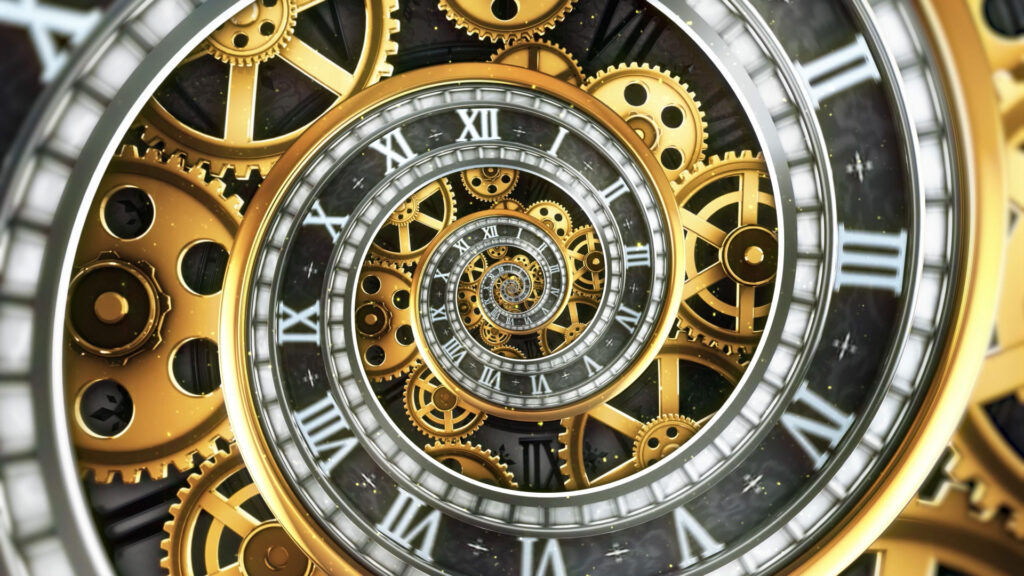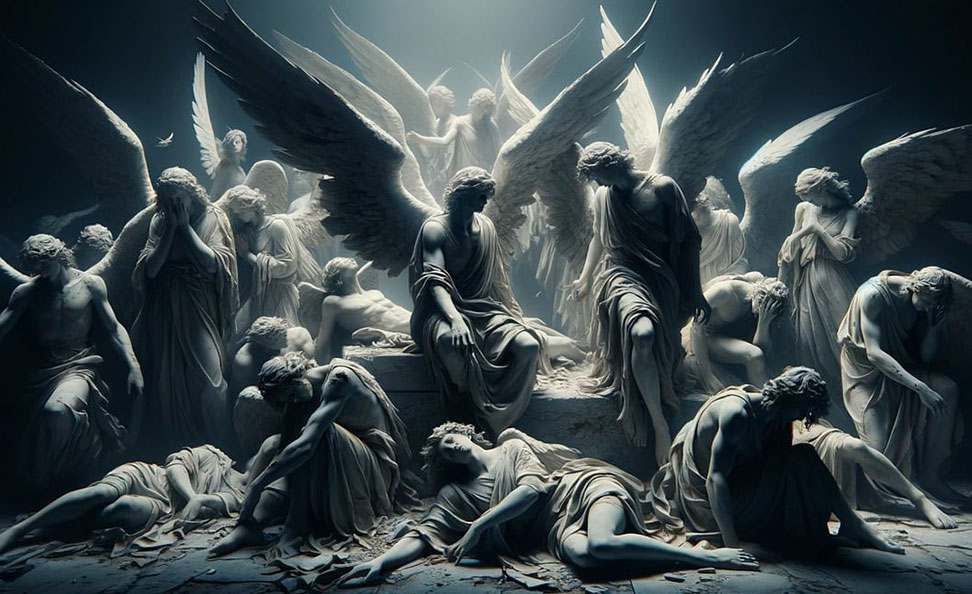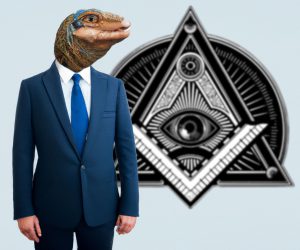Propaganda Due (P2) has long been a name entwined with mystery, intrigue, and dark secrets. Born as a seemingly innocuous Freemasons lodge in the late 19th century, P2 underwent a dramatic transformation over the years. Its original purpose of promoting moral and spiritual values among its members gradually gave way to a darker agenda. As a controversial, extremist, and highly secretive organization, P2 became involved in the Banco Ambrosiano scandal along with some of the most crucial and scandalous events in Italy’s modern history.
Over the years, P2 attracted an array of influential, high-ranking officials from various sectors of Italian society, including politics, the military, business, and intellectual circles. The organization expanded its reach, becoming a powerful subversive force operating behind the scenes. From political conspiracies aimed at toppling governments to financial scandals that shook the nation’s economy, this once reputable Masonic society slowly morphed into a hub of corruption and subterfuge.
In time, Propaganda Due would cast a long, sinister shadow over Italy’s political landscape. Its secretive dealings, covert operations, and hidden machinations would place P2 at the center of numerous national crises, forever altering the course of the country’s history. Little by little, P2 strayed from its original noble intentions and ultimately became a sinister entity, corrupting the very foundations of Italy’s political and social fabric.
Early History of P2 and Freemasonry in Italy
Founding of P2 in 1877 and Initial Goals
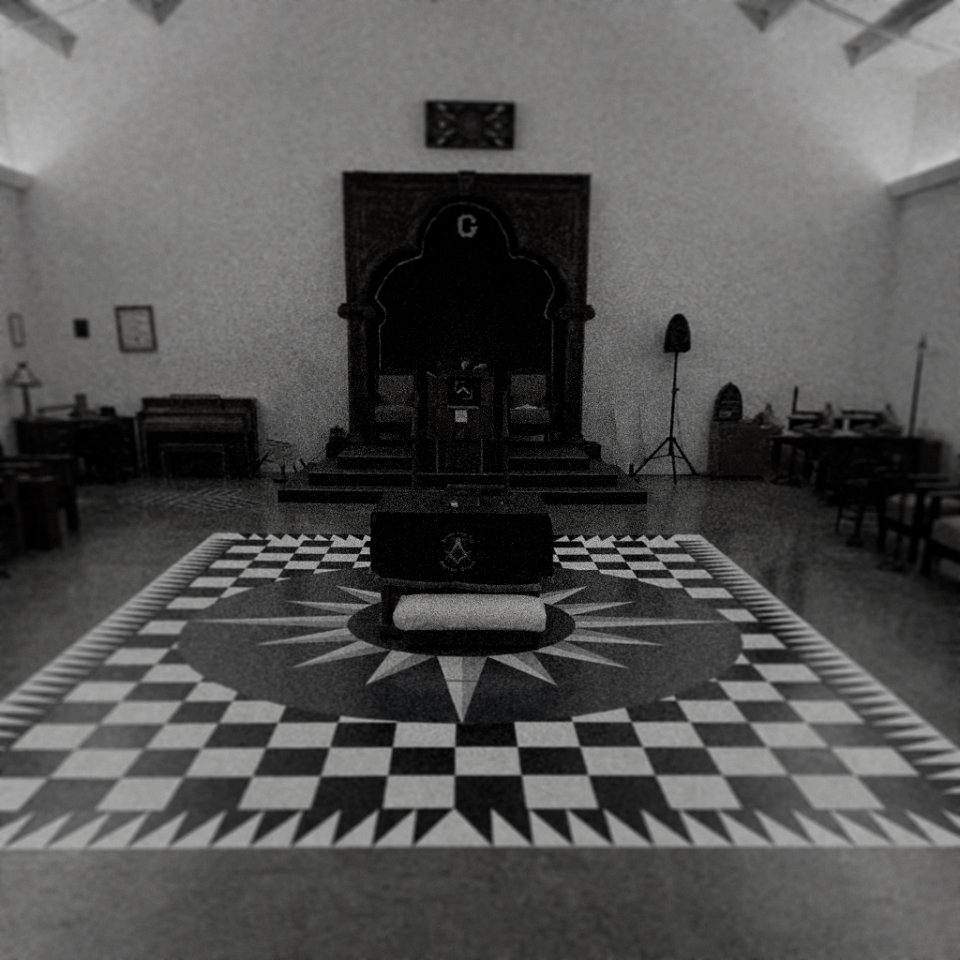
The establishment of Propaganda Due, commonly referred to as P2, on December 3, 1877, signified a crucial development in Italian history. Conceived by Italian politician, journalist, and activist Giuseppe Mazzini, the organization emerged as an offshoot of the Freemasons, an international fraternal society with a long, storied past.
Mazzini firmly believed that Freemasonry constituted an essential driving force for political and social transformation within Italy as well as the wider world. With this in mind, he set about bringing his vision to fruition by creating an organization that could advance these objectives.
The name “Propaganda” underscores P2’s primary function: to propagate Masonic ideas and values throughout Italy, thus fostering a climate where these principles could take root and flourish. Meanwhile, the appellation “Due” signifies P2’s status as the second Masonic lodge devoted exclusively to this end. The first such lodge, dubbed “P1” or “Propaganda Massonica,” was based in Rome and had been pursuing similar aims prior to P2’s inception.
Mazzini sought to unite a diverse group of influential and powerful Italians under the banner of P2, with the ultimate goal of instigating societal change from within the established power structures of the nation. By linking together prominent figures from various walks of life – including military officers, politicians, entrepreneurs, and academics – Mazzini hoped to create a formidable and effective force capable of bringing about genuine progress in line with Masonic ideals.
At its inception, the organization was characterized by a spirit of fraternity and collaboration, as well as a shared commitment to the core values of Freemasonry. Members gathered to exchange ideas, debate pressing issues, and work together toward the betterment of Italian society. P2 quickly gained a reputation as a hub for progressive thought, attracting individuals who, like Mazzini, believed that the secretive, ritualistic nature of the Masonic order could be harnessed to effect sweeping changes across the country.
As P2 grew in size and influence, the organization expanded its focus to encompass a range of pressing social and political concerns. Members strove to advance the cause of Italian nationalism, promoting the idea of a unified, prosperous Italy that could take its rightful place on the world stage. The group also embraced a liberal, progressive outlook, advocating for a range of reforms designed to promote social justice, civil rights, and economic development.
P2 distinguished itself through its staunch anti-clericalism, reflecting Mazzini’s deep-seated opposition to the political power of the Roman Catholic Church.
In its early years, P2 emerged as an influential promoter of Freemasonry in Italy, advancing a compelling vision of a society transformed by the principles of fraternity, tolerance, and self-improvement. As events unfolded over the ensuing decades, the organization would gradually distance itself from these original ideals, evolving into a life of secrecy and illicit activities.
Early Membership and Political Affiliations
From its inception, P2 proved to be a magnet for influential and powerful members of Italian society, drawing individuals from varied backgrounds with the promise of advancing progressive ideas and catalyzing positive social reforms.
The ranks of P2 included high-ranking military personnel, prominent politicians, wealthy businessmen, and leading intellectuals, reflecting the organization’s diverse appeal and its commitment to fostering an environment of collaboration across various sectors of society.
The intellectual members of P2, in particular, found the organization’s progressive outlook and potential for social change to be highly appealing, as they recognized the need for ongoing reform within Italy. By joining P2, these thinkers and visionaries hoped to contribute to the realization of a more equitable, enlightened society, driven by the principles of Freemasonry.
P2’s membership was firmly united by a shared political vision, one that emphasized nationalism, liberal progressivism, and anti-clericalism. Nationalism within the organization focused on fostering a strong sense of Italian identity and unity, with an ultimate goal of advancing the country’s interests on a global stage. Liberal progressivism among P2’s members manifested in a commitment to social justice, civil rights, and economic development, with the organization vigorously pursuing policies and initiatives that supported these objectives.
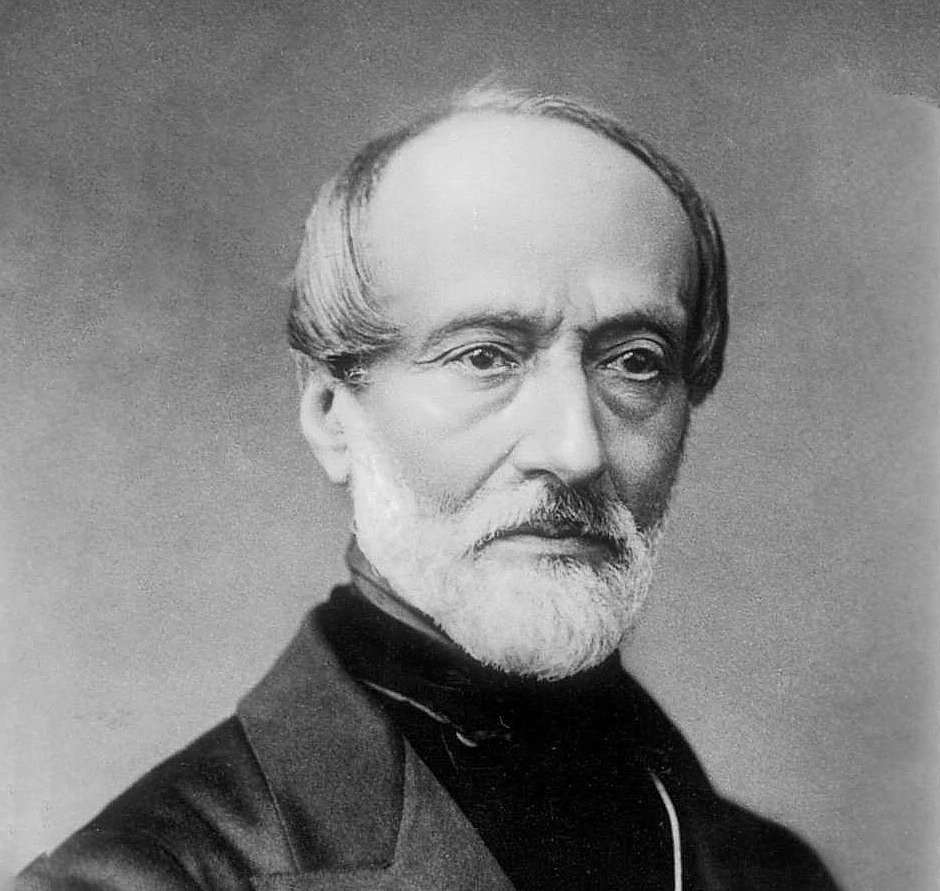
Giuseppe Mazzini – Founder of Propaganda Due (P2)
Masonic Lodge, Italy
At the same time, a strong current of anti-clericalism ran through P2, reflecting its founder Giuseppe Mazzini’s opposition to the political power wielded by the Roman Catholic Church. The organization’s members believed that the Church’s influence over political matters had a detrimental effect on the Italian nation’s progress and that lasting reform required a separation of Church and State.
This potent combination of shared goals and ideologies enabled P2 to rapidly expand its reach and influence during its early years, with its members collaborating extensively to advance their common objectives. The strong bonds forged among P2’s membership base played a critical role in facilitating heightened political activity, allowing the organization to punch above its weight in terms of impact and influence.
As a result, P2 began to be seen as a significant player within the Italian political landscape, an organization capable of shaping the nation’s future by promoting progressive ideas and reforms. As the decades wore on, internal and external forces would conspire to steer the organization in a markedly different direction, one that would ultimately diverge from the lofty ideals espoused by Mazzini and its early membership.
Rise of the Fascist Regime and Its Impact on P2
The rapid rise of Benito Mussolini and his National Fascist Party in 1922 precipitated a series of dramatic transformations within Italy’s political landscape. One of the defining characteristics of the Fascist regime was its authoritarian approach to governance, which manifested in crackdowns on political dissent and efforts to suppress organizations and movements perceived as threats. Freemasonry, and by extension P2, was one such target, given its association with liberal progressivism and anti-clericalism – both anathema to the Fascist ideology.
Such was the intensity of the Fascist regime’s hostility toward Freemasonry that, in 1925, Mussolini’s government officially disbanded P2, along with other Masonic lodges operating across the country. The new regime viewed Masonic lodges as breeding grounds for subversion and a direct challenge to its authority; eradicating these organizations was deemed essential for maintaining control over the nation.
Despite the official disbandment and increasingly hostile environment, P2 managed to endure, operating clandestinely throughout the Fascist era. The organization’s leaders and members recognized the importance of maintaining P2’s existence, albeit at a minimal capacity, to ensure that its core principles and beliefs could be preserved.
The years of operating in secret during the Fascist regime would profoundly alter P2. Moving away from its original mission and vision, the organization began to embrace a darker, more sinister path. As Italy emerged from the devastation of World War II, P2 would reemerge as well, bearing a strikingly different character to the one it had possessed in its early years.
P2’s transformation into a more insidious entity would be marked by a departure from its Masonic roots and an increasing involvement in a wide range of illicit activities. What had originally been a fraternal organization dedicated to the furtherance of progressive ideals and social reform would become a shadowy network of corruption and clandestine maneuvering, driven by the desire for power and control.
In the post-war years, P2’s actions and machinations would cast a long shadow over Italy’s political landscape, tainting its reputation and infusing the nation’s governance with a sense of intrigue and distrust. Mazzini’s initial vision for the organization – as a vanguard of progressive change and social upliftment – would be lost amidst the murky dealings and dark relationships that came to define P2 in its later years.
The P2 that emerged from the ashes of World War II bore little resemblance to the group that Mazzini had founded in 1877, and its controversial legacy would endure long after the organization itself had faded into history.
The Transformation of P2 into an Extremist Organization
The Propaganda Due (P2) Masonic lodge experienced a significant transformation during the 20th century. Originally founded as a socially progressive and politically active organization, it eventually evolved into an extremist group wielding substantial influence on Italian politics and society.
This transformation can be primarily attributed to three factors: the influence of fascism on P2’s ideology, infiltration of the lodge by politicians and business leaders, and an increasing focus on secrecy and extremist activities.
Influence of Fascism on P2's Ideology
One of the most significant factors contributing to P2’s transformation into an extremist organization was the influence of fascism on its ideology. The P2 lodge was founded during a time when Italy and other European countries were experiencing a rise in far-right ideologies. As the popularity of fascist political movements grew, some P2 members may have seen them as a potent tool to harness for their own purposes.
In the case of P2, their embrace of fascist ideology was largely driven by the pursuit of power and control. The leaders of P2 found that aligning with fascist groups provided them with resources and allies, which they could use to pursue their own agendas. This alliance allowed them to wield considerable influence over Italy’s political establishment and steer the nation’s policies in their preferred direction.
The infatuation with fascism also manifested in the form of admiration for strong, autocratic leaders. P2’s transformation into an extremist organization was significantly influenced by their support for autocratic rule and the belief that a select few should wield power over the masses. Rejection of democratic principles and embrace of authoritarian rule aligned with the fascist ideologies of the time and further solidified P2’s move towards extremism.
Infiltration of P2 by Politicians and Business Leaders
Another crucial factor in P2’s transformation into an extremist organization was the infiltration and eventual dominance of the lodge by influential politicians and business leaders. Many of these powerful figures joined P2 as a way to further their own careers and personal influence, positioning the organization as a vital part of Italy’s political landscape.
Once inside P2, these politicians and business leaders helped to reshape the organization’s goals and priorities. No longer focused on promoting progressive social change, the lodge instead became oriented towards maximizing the power and wealth of its members. This shift in focus was inextricably tied to the far-right ideologies gaining popularity at the time but was also a reflection of the new priorities of P2’s most influential members.
The infiltration of P2 by high-ranking politicians and business leaders had a profound impact on the lodge’s functioning and reputation. With these influential members holding sway over the organization’s direction, P2 became increasingly associated with political corruption, scandal, and abuse of power. Allegiances were formed with other extremist groups, and the lodge continued its steady march towards becoming a force for anti-democratic, authoritarian rule in Italy.
Increasing Secrecy and Extremist Activities
As P2 transformed into an extremist organization, an increased focus on secrecy and covert activities accompanied the shift. Members of the lodge became more guarded about their affiliations, and it is believed that connections to organized crime syndicates and far-right extremist groups became more entrenched.
The lodge also began to involve itself in various illicit activities, such as arms smuggling, money laundering, and even terrorism. These activities stood to benefit individual members and their businesses, while also serving the larger goals of the P2 lodge: the destabilization of Italian democracy and the eventual establishment of an authoritarian state. Thus, the shift towards secrecy and illicit activities served both the personal interests of P2’s influential members and the extremist ideological goals of the organization.
The increased secrecy of P2 also made it easier for the organization to avoid scrutiny from public and media. As their operations became more covert, it became more difficult for outsiders to unravel the lodge’s true intentions and machinations. This allowed P2 to continue its extremist activities with relative impunity, further propelling its evolution into a force for anti-democratic, far-right ideologies in Italy.
These factors combined to turn what was once a progressive and political active group into a secretive, extremist organization with a powerful grip on Italian politics and society.
Scandals and Controversies Involving P2
The Banco Ambrosiano Scandal
Brief Overview of the Scandal and its Consequences
The Banco Ambrosiano scandal was one of the largest financial scandals of the 20th century. Banco Ambrosiano, Italy’s largest private bank, Banco Ambrosiano, at the time, went bankrupt in 1982 after it was discovered that the bank had been involved in massive fraud and money laundering operations. At the heart of the scandal was the bank’s president, Roberto Calvi, who was found hanging under London’s Blackfriars Bridge in 1982 in what is still considered an unsolved murder.
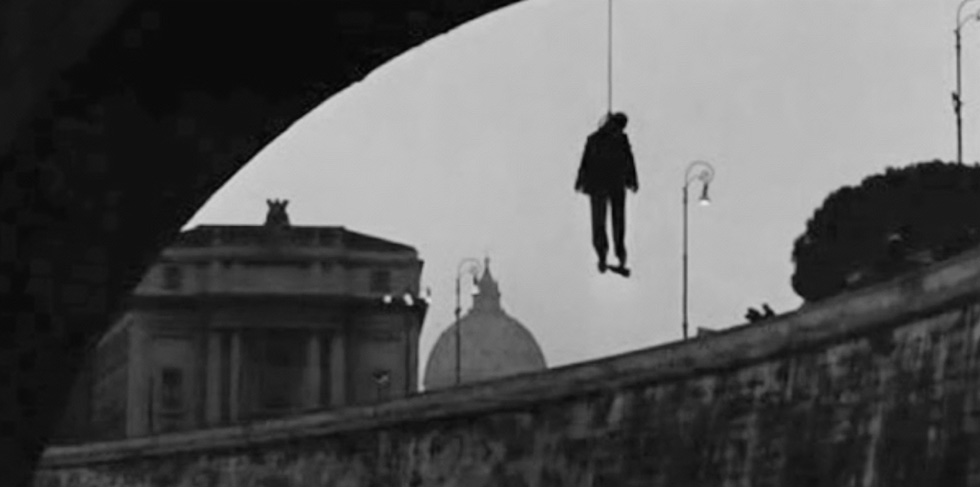
Roberto Calvi (1982) found dead and hanging from London’s Blackfriars Bridge
The scandal had far-reaching consequences, including the collapse of the Vatican Bank, which was a major shareholder in Banco Ambrosiano.
The Banco Ambrosiano’s close ties with the Vatican prompted questions about corruption within the Catholic Church itself.
The Banco Ambrosiano scandal not only shook the financial world but also exposed a complex network of political and criminal connections throughout Italy. Among these connections was the secretive and controversial Italian Masonic lodge known as P2 (Propaganda Due).
P2’s Involvement in Corruption, Fraud, and Money Laundering
The P2 lodge had been involved in various financial schemes, including the laundering of funds through the Banco Ambrosiano. While the extent of P2’s involvement in the scandal is still debated, many members of the lodge were directly implicated in the events leading to the collapse of the bank.
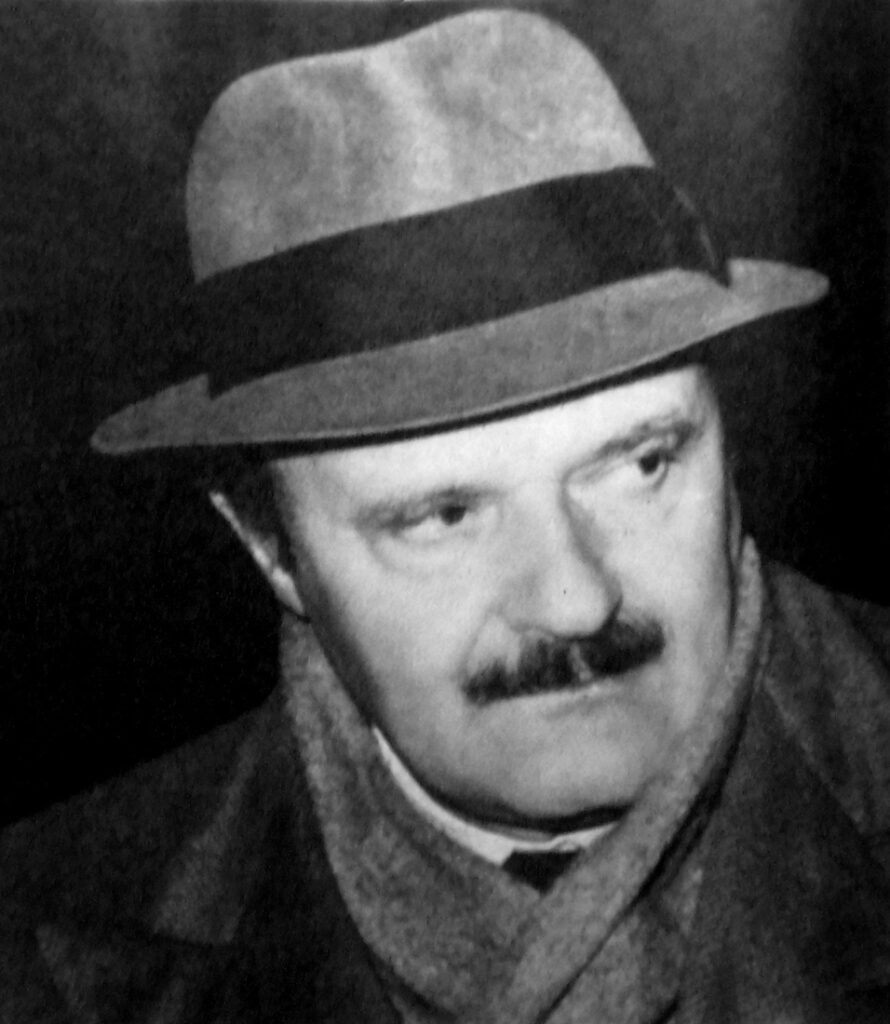
Roberto Calvi, the president of Banco Ambrosiano, was a member of P2 and was known as “God’s Banker” due to his close ties with the Vatican. It is believed that Calvi used Banco Ambrosiano to launder money for P2, the Vatican, and the Italian Mafia. He allegedly used a network of offshore shell companies to move large amounts of money across international borders, hiding the true source of the funds.
Licio Gelli, the leader of P2, was also implicated in the Banco Ambrosiano scandal. Gelli was accused of using Banco Ambrosiano to fund P2’s illegal activities and creating a slush fund for bribing politicians. He was arrested in 1982 and charged with fraudulent bankruptcy and money laundering.
Other P2 members who were involved in the bank’s affairs included Michele Sindona, a banker convicted of fraud and later murdered in prison, and Archbishop Paul Marcinkus, the head of the Vatican Bank, who was alleged to have conspired with Calvi and Gelli to cover up financial irregularities.
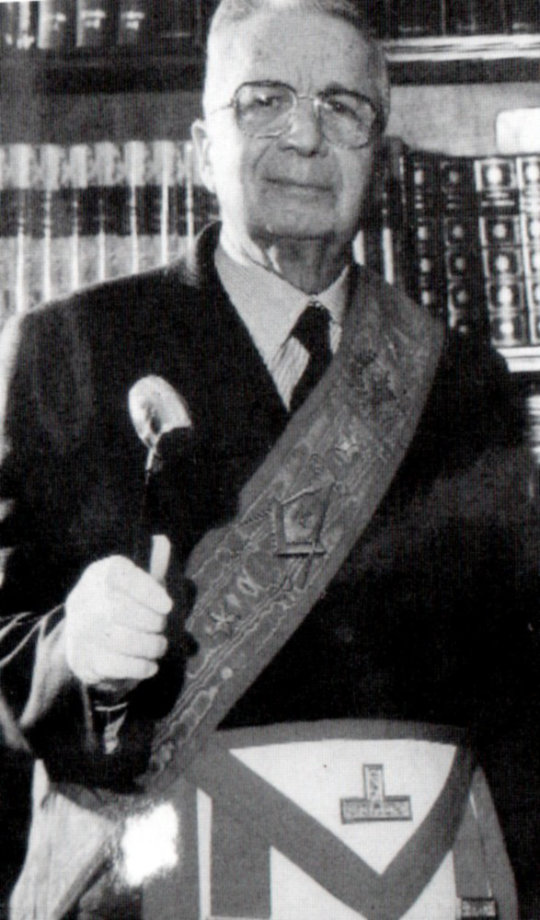
Licio Gelli – “Worshipful Master” of the Propaganda Due (P2) freemasons lodge of Italy.
Other High-Profile Scandals and P2's Connections to Organized Crime
The Banco Ambrosiano scandal was just one of many controversies that were linked to the P2 lodge. Throughout the 1970s and 1980s, P2 was connected to numerous scandals involving political corruption, criminal activity, and even terrorism.
In the late 1970s, P2 was implicated in a series of bombings in Italy, collectively known as the “Strategy of Tension.” These terrorist attacks were aimed at creating fear and instability, which P2 hoped would lead to a more authoritarian government and the discrediting of the Italian Communist Party.
P2 was also involved in the 1981 kidnapping and murder of the former Italian Prime Minister Aldo Moro. While the Red Brigades, a left-wing terrorist group, claimed responsibility for the crime, evidence later emerged suggesting that P2 members might have orchestrated the event to destabilize the government.
The lodge’s connections to organized crime were also extensive. P2 was known to have had close ties with the Italian Mafia, particularly the Sicilian Cosa Nostra and the Calabrian ‘Ndrangheta. The Mafia allegedly helped P2 to carry out its various illegal activities, including money laundering, drug trafficking, and arms dealing.
The Bologna train station bombing in 1980, which left 85 people dead, is another high-profile incident that has been linked to the P2 lodge. While no definitive proof has been found, many have speculated that P2 may have played a role in the planning and execution of the attack.
The Exposure of P2's Activities and the Reactions in Italy
The discovery of P2’s extensive involvement in illegal activities shocked the Italian public and led to widespread investigations and crackdowns on corruption and crime. In 1981, Italian law enforcement raided Licio Gelli’s villa and discovered a list of approximately 1,000 P2 members, which included prominent politicians, businessmen, and military officials. The document, known as the “P2 List,” sparked a nationwide scandal that ultimately led to the disbanding of the lodge and the arrest and conviction of many of its members.

Silvio Berlusconi – Italian Prime Minister – Alleged P2 Freemasons Member
The exposure of P2’s activities also had a significant impact on Italian politics, as several major political figures were implicated in the scandal. Among them were Prime Minister Arnaldo Forlani, who resigned in May 1981 following the revelations of P2 membership and infiltration of his government, and future Prime Minister Silvio Berlusconi, who was also listed as a P2 member.
The P2 scandals contributed to a general disillusionment with the Italian political system, which became synonymous with corruption and influence from shadowy secret societies.
This ultimately led to the collapse of the dominant Christian Democratic Party in the early 1990s and the rise of populist and anti-establishment political movements.
Despite its official disbanding, conspiracy theories about the P2 lodge and its influence on Italian society continue to circulate today. While most of its members have faced legal repercussions for their actions, the extent of P2’s infiltration of Italian politics and its deep connections to organized crime remain a subject of speculation and debate.
Investigation, Downfall, and Aftermath
The Propaganda Due (P2) scandal marked a critical turning point in Italy’s modern history, exposing the dark underbelly of corruption, collusion, and conspiracy between the country’s political, financial, and criminal elements. The investigation, downfall, and aftermath of P2 reverberated throughout Italy’s political and social landscape, with far-reaching effects that are still felt today.
This next section of the article explores the key events and consequences of the P2 scandal, including the Italian authorities’ investigation, arrests, convictions, and the disbanding of P2, as well as the escape of some members from prosecution and the broader impact on Italian politics and society.
Italian Authorities' Investigation into P2
The suspicious circumstances surrounding the death of banker Roberto Calvi, a member of the P2 secret Masonic lodge, in 1982 set the stage for Italian law enforcement to uncover the clandestine activities of P2. Suspicions were further aroused when it was revealed that Calvi’s bank, Banco Ambrosiano, had lost over one billion dollars due to fraudulent transactions. It later emerged that Licio Gelli, P2’s Grand Master, had orchestrated the massive swindle by funneling funds from Banco Ambrosiano to a complex network of offshore shell companies controlled by P2.
The Italian authorities’ investigation into P2 began in earnest when Milan prosecutors stumbled upon a list of more than 960 names of P2 members while raiding Gelli’s home in Tuscany. The list comprised powerful individuals from Italy’s political, business, and military elite, including politicians from various parties, industry leaders, high-ranking military officers, journalists, and mafiosi. As the extent of P2’s infiltration of the Italian state and society became apparent, the scandal sent shockwaves across the country and prompted the Italian Parliament to establish a special commission to investigate the lodge.
The commission’s findings confirmed that P2 was a “state within a state,” a clandestine network that sought to subvert Italy’s democratic institutions, manipulate public opinion, and consolidate power in the hands of a small, corrupt elite. It was also revealed that P2 had links to far-right paramilitary groups and was involved in acts of terrorism, such as the 1980 Bologna train station bombing, which killed 85 people, and the 1978 murder of former Italian Prime Minister Aldo Moro.
Arrests, Convictions, and the Disbanding of P2
The revelations stemming from the investigation into P2 sparked a massive law enforcement crackdown on the lodge and its members. Licio Gelli was arrested in Switzerland in 1982 and extradited to Italy the following year. He was subsequently charged with a range of crimes, including subversive association, fraud, and corruption. Several other prominent P2 members, such as former Interior Minister Carmine Pecorelli, were arrested and tried in connection with their involvement in the lodge. In 1984, Italy’s highest court upheld the parliamentary commission’s findings and ruled that P2 was a “subversive association” aimed at overthrowing the democratic order.
The Italian government moved swiftly to disband P2 and suppress its activities, passing legislation in 1982 that outlawed secret organizations and made it illegal for Freemasons to hold public office. The process of dismantling the lodge and prosecuting its members proved challenging, as the Italian legal system was ill-equipped to deal with the sheer scale and complexity of the case, and many key suspects managed to avoid justice by exploiting loopholes or fleeing the country.
Escape of some P2 Members from Prosecution
While several high-ranking P2 members were arrested, tried, and convicted, others managed to evade prosecution. This was partly due to the limitations of the Italian legal system, which struggled to manage the vast web of corruption and conspiracy that P2 had spun. The statutes of limitations on certain crimes also played a role in allowing some P2 members to escape justice.
In some cases, powerful P2 members were able to exploit their connections to avoid arrest or prosecution. For example, former Italian Prime Minister Silvio Berlusconi, who was identified as a P2 member in the 1980s, went on to amass significant political and economic power in Italy and has never faced formal charges or consequences for his involvement in the lodge.
Impact on Italian Politics and Society
The P2 scandal had a lasting and profound impact on Italian politics and society. The exposure of rampant corruption and collusion between the state, the business elite, and organized crime deeply eroded public trust in the country’s institutions. Political parties on both the left and right were implicated in the scandal, leading to widespread disillusionment with Italy’s post-war political order.
In this climate of uncertainty and distrust, new parties and political movements emerged to capitalize on popular discontent. The rise of populist and anti-establishment forces, as well as the increasing prominence of far-right and nationalist ideologies, can be traced to the political upheaval caused by the P2 scandal.
The investigation into P2 and its ramifications laid the groundwork for subsequent anti-corruption operations in Italy, such as the infamous “Mani Pulite” (Clean Hands) campaign of the 1990s, which exposed widespread corruption in the country’s political and business circles.
The exposure of the lodge’s insidious activities and its extensive network of corrupt and powerful individuals sent shockwaves across the country, leading to a crisis of confidence in Italian institutions and a profound realignment of the nation’s political landscape.
P2's Legacy and Influence on Italian Society and Politics
The Persistence of Conspiracy Theories Surrounding P2
Since the exposure of the Propaganda Due (P2) scandal in 1981, the clandestine Masonic lodge has continued to generate endless debates and conspiracy theories. The sheer clandestine nature of the P2 lodge, which was shadowed by allegations of conspiracy and dark secrets, has nourished its mythical character over the years.
The wide range of nefarious activities engaged in by P2 during the Italian Republic’s most critical years, such as the alleged involvement in the controversial “strategy of tension,” has led many to suspect that this mysterious entity is still active under different guises. It is believed by some that P2 continues to maintain power and influence over key components of national politics through covert networks and secret connections.
Conspiracy theories surrounding the deaths of individuals linked to P2, such as banker Roberto Calvi and journalist Mino Pecorelli, have further fueled suspicions that P2 is still operating covertly. Such theories suggest that both Calvi and Pecorelli were murdered for attempting to expose the essence of the shadowy organization and the figures that controlled its operations.
P2 has been linked to some of the most significant political scandals and criminal cases, both nationally and globally. Persistent speculations involve its connections to the notorious Bilderberg Group, the Central Intelligence Agency (CIA), NATO’s “Gladio” secret army, the mafia, and the Vatican. By weaving this intricate web of political alliances, P2 has left an enduring legacy for contemporary Italians.
The Influence of Former P2 Members in Modern Italian Politics
Although the P2 scandal happened four decades ago, the powerful figures who were promptly expelled from public institutions and banned from political activities have left an indelible mark on the Italian political landscape. The tentacles of the clandestine organization reached deep into various national sectors, including politics, finance, media, military, and intelligence services.
In the years following the P2 scandal, former members of the lodge continued navigating the murky waters of Italian politics and were implicated in various illicit dealings. It is believed that these individuals maintained control of their respective spheres of influence, dodging scandals and reinventing themselves to suit prevailing social and political climates. Some even managed to maintain prominent roles in politics, occupying key positions in both center-right and center-left parties.
Media mogul and former prime minister Silvio Berlusconi, a P2 member, managed to reshape Italy’s politics and the media landscape for over 20 years. Despite facing numerous charges of corruption, tax evasion, and criminal associations, Berlusconi’s resilience and powerful political network have allowed his political career to endure.
Another prominent figure in post-P2 Italy is the former governor of the Bank of Italy and Minister of Economy and Finance in the 1990s, Carlo Azeglio Ciampi. Although never formally implicated in any illicit activities, he was nonetheless listed among P2 members. Ciampi became President of the Italian Republic, holding power from 1999 to 2006.
Lessons Learned from the P2 Scandal and Efforts to Prevent Similar Organizations
The exposure of P2 in the early 1980s creates a dramatic moment of reckoning in Italy’s political history. The clandestine organization underscored the vulnerability of democracy and the consequences of unchecked power and corruption. As a result, post-P2 Italy experienced a series of critical reforms aimed at preventing the emergence of similar organizations.
One of the most significant reforms was the “clean hands” (mani pulite) campaign, launched by Italian magistrates in the early 1990s to tackle corruption and the pervasive influence P2 had left on Italian political institutions. The extensive investigation, which included various arrests of public officials and politicians, helped to signal a turning point for Italy’s tainted political landscape.
Efforts to separate the state and the media were also initiated, as the P2 environment highlighted the power that the media held over politics. By interfering in the media landscape, there was a risk of controlling the collective consciousness of society, an essential aspect that the P2 lodge sought to achieve. Consequently, various degrees of media separation were implemented to protect freedom of speech and guard against undue private interference.
Another critical lesson learned from the P2 scandal was the need for greater transparency and oversight in the financial sector. The exposure of pervasive corruption and underhanded connections within the financial realm, which facilitated P2’s illicit activities, prompted the Italian authorities to strengthen financial regulations and bolster the investigative powers of the central bank.
The P2 scandal cemented the importance of an independent judiciary system in safeguarding democracy. The magistrates who exposed the lodge’s dubious activities played an essential role in bringing the case to light, despite pressures from powerful individuals within the organization. This critical function reminded Italians that judicial independence is paramount in preserving a democratic society.
Mystical Finale
The story of Propaganda Due (P2) serves as a cautionary tale about the corruptive power of secret societies and their potential to subvert democratic institutions.
The P2 scandal revealed the dark underbelly of Italy’s political landscape, exposing a web of corruption, collusion, and conspiracy between politicians, business leaders, and criminal elements. As a result, Italy experienced significant political upheaval and reforms aimed at tackling corruption and preventing the emergence of similar organizations.
The legacy of P2 continues to cast a shadow over Italy’s political and social landscape and serves as a reminder of the ongoing need for transparency, strong checks and balances, and a vigilant, independent judiciary in safeguarding democracies around the world.

